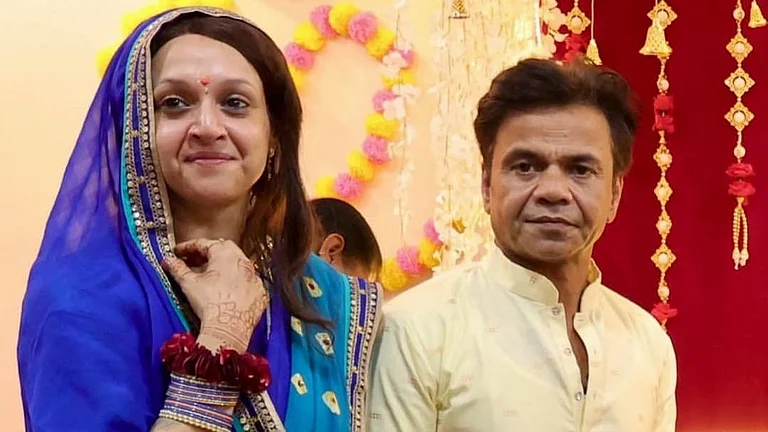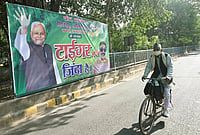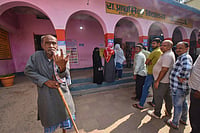Senior journalist and political commentator Rasheed Kidwai’s recently released book “The House of Scindias: A Saga of Power, Politics, and Intrigue” offers a unique account of the Scindia family and its celebrated political icons who have influenced the courses of Indian politics substantially. The book is an essential read for the keen political observers and the readers with interest to know about the past and present of India through power corridors.
It is a well-known fact that the Scindia dynasty is a Hindu Maratha dynasty of Kunbi origin that ruled the erstwhile State of Gwalior. It was founded by Ranoji Scindia, who started as a "slipper-bearer" of the Peshwa Bajirao. Ranoji and his descendants along with their rivals the Holkars played a leading role during the Maratha ascendency in North India during the 18th century. The Gwalior state was a princely state under the British Raj during the 19th and 20th centuries. After India's independence in 1947, several members of the Sindhia family went on to join Indian politics. In 1962, Vijayaraje Scindia (also known as Rajmata Scindia), the widow of Maharaja Jiwajirao, was elected to the Lok Sabha, beginning the family's entry into electoral politics.
It is said that she was persuaded by India’s first Prime Minister Jawaharlal Nehru to fight the Lok Sabha election and that she accepted. She was first a member of the Congress Party, and later became an influential member of the Bharatiya Janata Party. Her son Madhavrao Scindia was elected to the Lok Sabha in 1971 representing the Jansangh Party, he joined Congress in 1980 and served until he died in 2001. His son, Jyotiraditya Scindia, joined the Congress Party and was elected to the seat formerly held by his father in 2004. He later joined the Bharatiya Janata Party on 11 March 2020 and is now a Member of the Rajya Sabha and the Union Minister of Civil Aviation. Together with the stories of Vasundhara Raje Scindia and Yasodhara Raje Scindia, the family’s extraordinary journey in Indian politics is completed.
As a Maharani, Rajmata Scindia had thousands of servants and several enormous palaces. After Independence, which marked the end of the supremacy of the Maharajas, she emerged as one of India's most popular political leaders, first with the Congress party and later with Jan Sangh and BJP. Her appeal to the masses amazed both her admirers and her critics. Unlike Vijayaraje Scindia, or her son or grandson, her daughters served only BJP. Vasundhara Raje Scindia contested and won five parliamentary elections from Madhya Pradesh and Rajasthan. Under the Vajpayee-led NDA government from 1998 onwards, Vasundhara was in charge of several different ministries. In 2003 she led the BJP to its largest majority in Rajasthan and became the state's, Chief Minister. In 2013 again, she led Bharatiya Janata Party to a thumping win in the state of Rajasthan, winning over 160 out of the 200 seats in the assembly elections. Her other daughter, Yashodhara Raje Scindia, contested assembly elections from Shivpuri in Madhya Pradesh and won in 1998, 2003, and 2013 and also Lok Sabha 2004, 2009 from Gwalior. Upon the BJP's win in the state, she became the state's Minister for Tourism, Sports, and Youth Affairs. Vasundhara's son Dushyant Singh entered the Lok Sabha in 2004 from Rajasthan. Rasheed Kidwai writes with command about the lesser-known facts about Scindias and engages his readers in his signature style.
Weeks before India announced a sudden lockdown to combat the Covid-19 pandemic in March 2020, the drama and governance coup in Madhya Pradesh’s political theatre was already peaking. Jyotiraditya Scindia dumped the Congress overnight for the BJP bringing down the former from power in the state. Many saw the return of the prodigal grandson as the reunion of the political dynasty of Scindias under BJP’s catch-all umbrella. Jostling to spill over, along with priceless jewels in the treasury of Jai Vilas Palace the Scindias’ royal abode in Gwalior is many carefully buried secrets. Some are best hidden away, such as the Gwalior monarchs’ controversial role during the Revolt of 1857. Others need to be kept out of sight for diplomatic causes, such as the Rajmata’s excessive dependency on her ‘Rasputin (Sardar Angre)’ and the resultant mistrust of her only son, Madhavrao. With a vivid account of rarely touched matters related to Scindias, Rasheed Kidwai immortalizes the genre of political biography.
It is worthwhile to get a sense out of this, “One of the bigger questions is the palace’s alleged and under-probed role in Mahatma Gandhi’s assassination. It is perhaps because of these mysteries that curiosity about the Scindias—a family that has given India many states persons across party lines—continues to dominate India’s public imagination. Scindias do come across as privileged, able, careerists. Their greatest motivation is to advance their political careers and wealth, there is no higher purpose to their politics or beliefs.”
The section dealing with Jyotiraditya's exit from congress is most insightful, this is as close as one gets to real calculations that go into the political decision-making of this type. What exactly is the extent of the wealth amassed by the Scindias, the erstwhile ruling family of Gwalior?
How was it generated and how is it to be distributed among its four claimants?
These are some of the questions raised in political analyst, columnist, author, and journalist Rasheed Kidwai’s family biography. “The history of the Scindias is best told through their lawsuits over property,” Kidwai writes, and poses the question: “How about a 400-billion-rupee property dispute? Or is the figure higher?”
He answers, “The answer is no if one goes by the affidavits the Scindias have filed for parliamentary and assembly elections from 1957 (when the Rajmata first entered the fray) till date. Their wealth appears to be far less than popular perceptions about what is being fought over in protracted legal battles across the country. According to some estimates – it is impossible to arrive at a definitive figure – these disputes are over properties worth around Rs 40,000 crore. Some of these disputes have been dragging on for over thirty years among the former royals of the erstwhile Gwalior state, Jyotiraditya Scindia and his three aunts, amid speculation that the legal battle may be settled out of court,” Kidwai writes and adds, “Neither side has denied or confirmed anything related to their legal battles, let alone reveal any details.”
The roots of the dispute lie in the fact that when Jyotiraditya’s grandfather, Jiwajirao Scindia, the erstwhile Maharaja of Gwalior, died in 1961, he had not left instructions about how his immovable and movable properties were to be divided among his descendants. The properties were initially divided equally between his widow, Vijaya Raje, and his only son, Madhavrao, after she filed a suit in the Bombay High Court, back in 1984. Mother and son both had a 50 per cent share in the large number of immovable properties spread across India. “In his case, Jyotiraditya had invoked the Scindia custom of primogeniture,” Kidwai writes.
The Scindia scion claimed that the provisions of the Hindu Succession Act that normally divide property equally among the descendants do not apply to the princely line as these were excluded by Section 5 (2) of the Act relating to the inheritance of a family. His aunts, Usha Raje (settled in Nepal), Vasundhara, and Yashodhara contested the claim, citing their mother’s will of September 20, 1985.
Sardar Sambhajirao Rao Angre, “a master of intrigue and former private secretary to Vijaya Raje, who had a fractious relationship with Madhavrao” stepped in, Kidwai writes further, “to explain that the custom of the firstborn enjoying ‘jyeshtbadhikar (primogeniture) could not be established beyond doubt as almost everyone who had ascended the throne of Gwalior before Jyotiraditya’s great-grandfather, Madhav Maharaj, did have been adopted. That was how the Scindia’s had managed to avoid the Doctrine of Lapse that eventually led to the 1857 rebellion by the Rani of Jhansi, Lakshmibai ''.
Then, immediately after Vijaya Raje died in 2001, Angre produced her handwritten will drafted in 1985 that had disinherited her son and grandson while bequeathing two-third of the assets to her daughters and one-third to a charity through a trust that would, in turn, cover the 15 trusts she had formed in 1975, just before the Emergency, to manage the properties. “While the legal feasibility of an umbrella trust is questionable, this will is being examined in a probate case by Delhi High Court and is currently in the stage of evidence,” Kidwai writes in the book.
Vijaya Raje’s solicitors in Mumbai had produced another will in 2001that excluded not only her son and grandson but the charities as well, leaving the entire block of properties that were under her control to her daughters. This will is also being examined in a probate case, this time by the Bombay High Court, and is in the evidence state. The two wills “are important because of an agreement in 1971 when Prime Minister Indira Gandhi had scrapped the system of privy purses. At that point, the Scindias were getting Rs 25 lakh annually, apart from incomes from various trusts”, Rasheed Kidwai writes in detail.
Immediately after that, the Scindias had divided their assets through a verbal agreement: the immovable properties had gone to the mother and the cash, shares, and debentures to the son. A Mumbai court formalised this in 1975. In his suit, Jyotiraditya challenged the verbal agreement of 1971 and the subsequent court division of 1975 between his grandmother and father. In October 2017, Jyotiraditya expressed a desire for an out-of-court settlement and this agreed to the appointment of a commissioner, who, however, died during the process. In June 2019, “the prospects of a compromise suffered a setback when the Bombay High Court refused a request by Jyotiraditya to strike off a fresh written statement by his aunts, claiming that they had retracted from their earlier stance in the family’s property dispute”, Kidwai writes. “With Jyotiraditya joining the BJP in March 2020, many in Gwalior and Bhopal feel that the growing cordiality among the nephew and his aunts Vasundhara and Yashodhara (Usha Raje doesn’t take any interest in the case) will help resolve the property disputes,” Kidwai adds.
We also come to know through the book that Jyotiraditya’s initial years were spent in Nepal, where he was home-schooled. When post-Emergency, Madhavrao returned to India from Nepal, he made it a point not to send his son to the family-owned Scindia School in Gwalior. Madhavrao must have been conscious of the ‘preferential treatment’ he had received in Scindia School despite father Jiwajirao Scindia’s specific instructions not to treat his son differently.
The section dealing with Jyotiraditya's exit from congress is most insightful, this is as close as one gets to real calculations that go into the political decision-making of this type. When Jyotiraditya Scindia announced in March 2020 that he was quitting the Congress, former external affairs minister Natwar Singh said he wasn’t surprised, before adding that Jyotiraditya’s father “Madhavrao Scindia would have been Prime Minister if he had lived.” Perhaps Singh was trying to tell the young leader that he had extreme opportunities in the Congress. Sixteen months later, Jyotiraditya Scindia, a Harvard alumnus, and a cricket enthusiast find he can reach greater heights in the BJP, which he had joined a day after resigning from the Congress last year.
Rasheed Kidwai makes his work richer by bringing humane sides of Scindias, especially of Madhavrao. He writes that after starting the Shatabdi trains as the railway minister in the Rajiv Gandhi Cabinet, Madhavrao Scindia became a hero of the middle class. People used to send gifts like bouquets, perfumes, and handkerchiefs at his office in Shastri Bhawan with an inscription saying ‘aam aadmi ke maharaj’ (the king of the common folk). To attain popularity in Madhya Pradesh, Jyotiraditya Scindia can learn best from the works his father did as the Congress leader. The house of Scindias’ will remain important, however, it would be important to see how long they stick to merely a careerist approach in politics.
Book: “The House of Scindias: A Saga of Power, Politics, and Intrigue” by Rasheed Kidwai
Published by ROLI BOOKS
Price: Rs 395
(Ashutosh Kumar Thakur is a member of the Kalinga Literary Festival organising committee and a literary critic. He can be reached at: ashutoshbthakur@gmail.com)


























